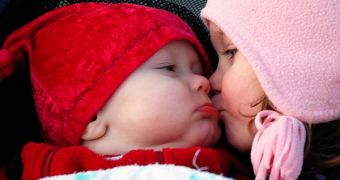This natural weakness that babies born in autumn display to asthma is apparently caused by the fact that they are only 3 to 4 months old during the peak of the flu and cold season, which starts in late October. In an underdeveloped immune system, such as that of newborns, this disease can cause proneness to this severe medical condition, which can lead to the kids suffering from it having to follow medical treatment throughout their lives.
Researchers at the Vanderbilt University, led by the director of the center for Asthma Research, Dr. Tina Hartert, studied the cases of 95,000 newborns and their mothers, in Tennessee. "What we were able to show was the timing of birth and the risk of developing asthma moves in time almost to the day with the peak of these viral infections each winter. All infants are exposed to this and it is potentially preventable," she said.
A regular lung infection, which goes by the name of bronchiolitis, was identified in all studied children, but in those that were born in autumn, the condition manifested more markedly. The study was the first to thoroughly tie peak activities in viral infections during the flu season to more cases of asthma among small children.
Hartert also said that, in the kids carrying the gene prompting the development of the disease, common infections could trigger those genes and pave the way for the development of the condition. She identified the age between 3 and 5 months as the most dangerous in an infant's life, in terms of their exposure to the RSV virus, which is regularly cleared by the immune system. However, in children born in autumn, the virus can leave behind markers that facilitate the appearance of asthma.
Currently, there is no vaccine to address this issue, but companies such as GenVec Inc and the MedImmune Unit at AstraZeneca are working on developing one. "It's in the pipeline. We just don't have one yet," concluded Hartert.

 14 DAY TRIAL //
14 DAY TRIAL //